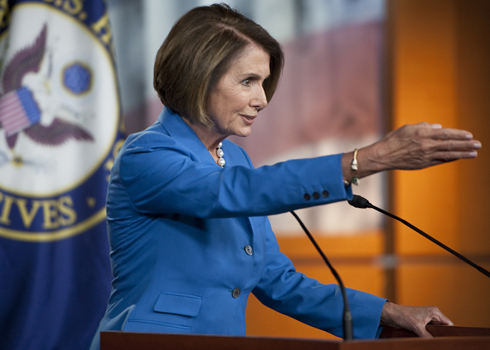In March 2010, as he was preparing to vote for the health care law, conservative advocates published photos of then-Rep. Steve Driehaus (D-OH) with his family — and posted his address, and directions to his house — on the internet.
Then-House Minority Leader John Boehner, who represents a district adjacent to the one Driehaus served, told a conservative magazine that Driehaus would be a “dead man” in Cincinnati if he voted for the legislation. After the vote, Driehaus vented.
“These comments that have been made by Republican leaders can serve as–I don’t know if I want to say an excuse or perhaps permission for people who may be unbalanced, who may be calling with these threats,” Driehaus told me.
Driehaus confronted Boehner about the interview on the floor of the House. “I told him it was inexcusable,” Driehaus said. “It doesn’t really matter the way you meant it, nor the way I accept it. It’s how the least sane person in my district accepts it.”
From the August 2009 town halls through the passage of the health care law Democrats made the very same argument — that political vitriol can incite unhinged people — that law enforcement officials are making now in the wake of the Arizona shooting spree.
No one was more prescient than then-House Speaker Nancy Pelosi, who saw this scene play out in 1978, when a jaded San Francisco supervisor, Dan White, murdered his colleague Harvey Milk — a gay rights activist — and mayor George Moscone.
“I have concerns about some of the language that is being used because I saw, I saw this myself in the late ’70s in San Francisco, this king of rhetoric. It’s very frightening, It created a climate in which violence took place,” Pelosi said in September 2009.
Six months later, as Congress took its final votes on the bill, Republican House members revved up a furious crowd from the balcony outside the Speaker’s lobby, and cheered on the House floor as protesters chanted “kill the bill” from the viewing gallery. Pelosi reiterated the same concern.
Leadership, she said, has a responsibility to serve as “an example of how we express our differences and understand the impact that our words have on others. The best way to do that is to very clearly state that this is inappropriate.”
“It’s inappropriate for members of Congress to stand up and cheer when these sentiments are expressed,” she added
Both times, Republicans responded by turning the tables on Democrats.
“Speaker Pelosi is right that the American people are upset, but it is her own words that continue to fuel voter frustration in America,” said NRCC chairman Pete Sessions after Pelosi’s September remarks.
In March, then-House Minority Leader Eric Cantor lashed out at the entire Democratic leadership for trying to tie conservative rhetoric to acts of violence, real and potential.
In a press conference yesterday, Pima County Sheriff Clarence Dupnik said overheated rhetoric is a major driver of lone-wolf violence — that if unstable people believe the government is a threat to their mortal freedoms, violence will seem like a logical remedy.
“I I think that when the rhetoric about hatred about mistrust of government about paranoia about how government operates, and to try to inflame the public on a daily basis 24 hours a day 7 days a week has impact on people especially who are unbalanced personalities to begin with,” he said.
At the same event, FBI Director Robert Mueller made the same point using milder language.
“The ubiquitous nature of the Internet means that hate speech and other inciteful speech is much more readily available … than it was eight or 10 or 15 years ago, and that absolutely presents a challenge for us,” he said.










